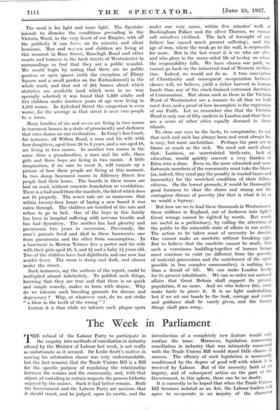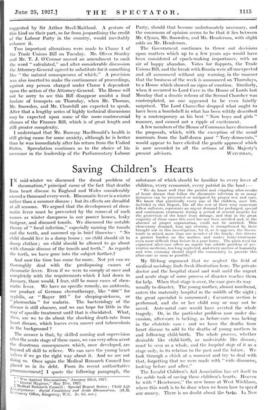The Week in Parliament
THE refusal of the Labour Party to participate in the enquiry into methods of conciliation in industry offered by the Minister of Labour last week, is not really so unfortunate as it seemed. Sir Leslie Scott's motive in moving his arbitration clause was very understandable, but the fact remains that the Trade Unions Bill is a Bill for the specific purpose of regulating the relationship between the unions and the community, and, with that object, of curtailing in certain respects the powers hitherto enjoyed by the unions. Such it had better remain. Both the Government and the Labour Party are anxious that it should stand, and be judged, upon its merits, and the introduction of a completely new feature would only confuse the issue. Moreover, legislation concerning conciliation in industry that was intimately connected with the Trade' Unions Bill would stand little chance of success. The efficacy of such legislation is necessarily conditioned by the degree of good will with which it is received by Labour. But of the necessity both of an inquiry, and of subsequent action on the part of the Government, in this sphere, there can be no doubt. It is earnestly to be hoped that when the Trade Unions Bill becomes isolated as an Act, the Labour leaders will agree to co-operate in an inquiry of the character suggested by Sir Arthur Steel-Maitland. A gesture of this kind on their part, so far from jeopardizing the credit of the Labour Party in the country, would inevitably enhance it.
Two important alterations were made to Clause 1 of the Trade Unions Bill on Tuesday. Mr. Oliver Stanley and Mr. T. J. O'Connor moved an amendment to omit the word " calculated," and after considerable discussion the Attorney-General agreed to substitute for it something like " the natural consequences of which." A provision was also inserted to make the continuance of proceedings, against any person charged under Clause 1 dependent upon the action of the Attorney-General. The House will not be sorry to see this Bill disappear amidst a final fanfare of trumpets on Thursday, when Mr. Thomas, Mr. Snowden, and Mr. Churchill are expected to speak. After that a lengthy series of highly technical discussions may be expected upon some of the more controversial clauses of the Finance Bill, which is of great length and still greater complexity.
I understand that Mr. Ramsay MacDonald's health is still giving cause for some anxiety, although he is better than he was immediately after his return from the United States. Speculation continues as to the ohoice of his successor in the leadership of the Parliamentary Labour Party, should that become unfortunately necessary, and the consensus of opinion seems to be that it lies between Mr. Clynes, Mr. Snowden, and Mr. Henderson, with slight odds on Mr. Henderson.
The Government continues to throw out decisions upon matters which up to a few years ago would have been considered of epoch-making importance, with an air of happy abandon. ITOtes for flappers, the Trade Unions Bill, and the break with Russia were all unexpected and all announced without any warning, in the manner that the business of the week is announced on Thursdays, to a House which showed no signs of emotion. Similarly, when it occurred to Lord Cave in the House of Lords last Monday that a drastic reform of the Second Chamber was contemplated, no one appeared to be even faintly surprised. The Lord Chancellor dropped what ought to have been a bombshell in what has been wittily described by a contemporary as his best " Now boys and girls " manner, and caused not a ripple of excitement.
A few members of the House of Commons have discussed the proposals, which, with the exception of the usual murmurs from the half-dozen poor " Tory-democrats," would appear to have elicited the gentle approval which is now accorded to all the actions of His Majesty's















































 Previous page
Previous page